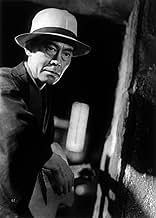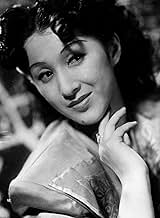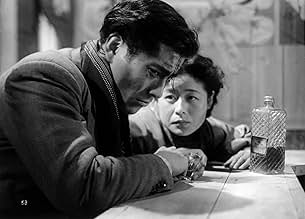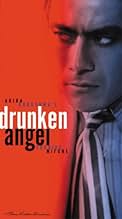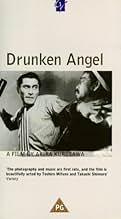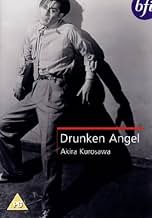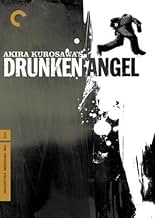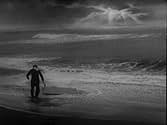IMDb रेटिंग
7.6/10
14 हज़ार
आपकी रेटिंग
अपनी भाषा में प्लॉट जोड़ेंA drunken doctor with a hot temper and a violence-prone gangster with tuberculosis form a quicksilver bond.A drunken doctor with a hot temper and a violence-prone gangster with tuberculosis form a quicksilver bond.A drunken doctor with a hot temper and a violence-prone gangster with tuberculosis form a quicksilver bond.
- निर्देशक
- लेखक
- स्टार
- पुरस्कार
- कुल 4 जीत
Mayuri Mokushô
- Daughter at Flower Shop
- (as Kumiko Mokushô)
फ़ीचर्ड समीक्षाएं
A very, very vivid film from Japanese legend, Akira Kurosawa. The Japanese town that is the setting for "Drunken Angel" is vividly captured by Kurosawa, and the filthy swamp that separates the doctor from the filthiness of the town is brilliant. Toshiro Mifune plays a tuberculosis stricken gangster who is slowly won over, despite his vicious pride, by the caring but sarcastic doctor. The swamp is a reflection of the corruption in the town and in one of the first scenes a group of children are seen playing in it. Kurosawa's way of foreshadowing these children's future since the town is controlled by the immoral gangsters. With the arrival of Okadu, a released convict and gangster, and struggles with his health, Mifune struggles through conflicts of soul which are brilliantly metaphored by Kurosawa. A great drama with some brilliant commentary about post-WW2 Japan. Solid characters carry with film about typical with the Doctor being an unforgettable creation and Toshiro Mifune giving a powerful performance.
Considering this is the first collaboration between one of the 'heavyweight' director/star combos in cinema (tops in the Japanese film world, probably their equal to America's Scorsese/De Niro), this is quite a powerhouse of drama. That's not to say it's a completely dour film- some of Akira Kurosawa's trademark ironic (and subtle) humor is laced into scenes. But more-over, Kurosawa made here an important film for its time. While the team of Kurosawa and Toshiro Mifune would become even more internationally known for the thrilling Japanese mystery Stray Dog, and the masterpiece Rashomon, this film seems to get a little under-looked by Kurosawa fans (at least those that haven't quite dug into the catalog of their work). Is it their very best? Not quite, but it ranks high up there for me.
And it's not just the collaboration of the director and the star- there is also the co-star, Takashi Shimura, who has made his great mark on many of Kurosawa's films (the two I mentioned previous, plus his best role in Ikiru, and Seven Samurai as well). He plays a doctor who can't quite lay off the booze, even as he tries to help the people around him who seem to be contracting all sorts of bad diseases from the contaminated water (most notably tuberculosis). Mifune plays a member of the Yakuza crime gang, but is more of just a low level thug than a real 'somebody'. He's getting signs of TB, and goes to the 'good' doctor, who refuses help to the Yakuza, having outright contempt for them. Through the course of the film, The two actors portray these people as fragile, intense, hostile, compassionate, and with all the great emotional impact that comes in Japanese dramas.
While one might want to check this out for the context of the Yakuza part of the plot (which was one reason I wanted to check it out- not the Yakuza in today's Japanese cinema of course), the side that Kurosawa shows wonderfully in a film like Red Beard is also brought to light here. There's some action, but it gets thrown into a larger, more emotional context as Mifune's character starts to deteriorate. It becomes very theatrical in a sense, but there is also the realism that Kurosawa had on his sleeve, one that he had to express in post-war Japan (many of these post-war images are better expressed in Stray Dog, but he gives some ample time here too in a subtler, more dangerous context). So this mix comes together, and it turns into one hell of a picture. It may feel a little on the weak side compared to some of Kurosawa's magnum opuses (Seven Samurai, Ran, Yojimbo come to mind). Yet it ranks as an important point in the careers of the actors and director, and it contains enough great moments, enough in terms of the position of the camera and the often shattering music, to make it an under-rated (perhaps minor) classic. Personally, I loved it- especially the last twenty minutes.
And it's not just the collaboration of the director and the star- there is also the co-star, Takashi Shimura, who has made his great mark on many of Kurosawa's films (the two I mentioned previous, plus his best role in Ikiru, and Seven Samurai as well). He plays a doctor who can't quite lay off the booze, even as he tries to help the people around him who seem to be contracting all sorts of bad diseases from the contaminated water (most notably tuberculosis). Mifune plays a member of the Yakuza crime gang, but is more of just a low level thug than a real 'somebody'. He's getting signs of TB, and goes to the 'good' doctor, who refuses help to the Yakuza, having outright contempt for them. Through the course of the film, The two actors portray these people as fragile, intense, hostile, compassionate, and with all the great emotional impact that comes in Japanese dramas.
While one might want to check this out for the context of the Yakuza part of the plot (which was one reason I wanted to check it out- not the Yakuza in today's Japanese cinema of course), the side that Kurosawa shows wonderfully in a film like Red Beard is also brought to light here. There's some action, but it gets thrown into a larger, more emotional context as Mifune's character starts to deteriorate. It becomes very theatrical in a sense, but there is also the realism that Kurosawa had on his sleeve, one that he had to express in post-war Japan (many of these post-war images are better expressed in Stray Dog, but he gives some ample time here too in a subtler, more dangerous context). So this mix comes together, and it turns into one hell of a picture. It may feel a little on the weak side compared to some of Kurosawa's magnum opuses (Seven Samurai, Ran, Yojimbo come to mind). Yet it ranks as an important point in the careers of the actors and director, and it contains enough great moments, enough in terms of the position of the camera and the often shattering music, to make it an under-rated (perhaps minor) classic. Personally, I loved it- especially the last twenty minutes.
I loved this movie for many reasons:
The film history : it's the first collaboration between Akira Kurosawa (director) and Toshiro Mifune (actor) that continued through 15 more films including the sublime Rashomon, Seven Samurai and Yojimbo.
The style : it's a great film noir with gangsters, zoot suits, speakeasy's, gambling etc.,
The history : post WW II Japan is a frightening place with rubble, raw sewage, crime and hope. It's a world I hadn't seen before.
Toshiro Mifune : What an amazing actor. He oozes charisma and you cannot take your eyes off of him. His performance reminded me of the first time I saw Russell Crowe, in a little seen mediocre movie called "For the Moment" which I watched many times because of Crowe's intensity.
My only problem is the copy I saw was terrible. The print was faded and half of the subtitles were illegible. When will this be released on DVD? It's not Kurosawa's best film, but it's certainly better than most of the drivel out there.
The film history : it's the first collaboration between Akira Kurosawa (director) and Toshiro Mifune (actor) that continued through 15 more films including the sublime Rashomon, Seven Samurai and Yojimbo.
The style : it's a great film noir with gangsters, zoot suits, speakeasy's, gambling etc.,
The history : post WW II Japan is a frightening place with rubble, raw sewage, crime and hope. It's a world I hadn't seen before.
Toshiro Mifune : What an amazing actor. He oozes charisma and you cannot take your eyes off of him. His performance reminded me of the first time I saw Russell Crowe, in a little seen mediocre movie called "For the Moment" which I watched many times because of Crowe's intensity.
My only problem is the copy I saw was terrible. The print was faded and half of the subtitles were illegible. When will this be released on DVD? It's not Kurosawa's best film, but it's certainly better than most of the drivel out there.
Kurosawa began his career as a jobbing director, making the pictures the studio wanted him to in conventional, by-the-book style. It was with Drunken Angel, his eighth film, that he turned a corner. He regarded it as the first film that was really his, and typically here combining bold social commentary with tender sympathy towards flawed and downtrodden characters.
This also marks the beginning of one of the greatest actor-director relationships in the history of cinema, with the young Toshiro Mifune making his debut for Kurosawa. It is amazing how naturally talented an actor Mifune was. He already knew exactly how to move in front of the camera, and could convey so much with the tiniest of gestures. However, he doesn't get to show off his full range here. Also, in the leading role, is Kurosawa regular and fantastic character actor Takashi Shimura. There isn't really one bad performance in the whole thing.
Drunken Angel is essentially a lament for the state of post-war Japanese society. Not only does the story concern the victims of that era, it is also an extended allegory using illness and contamination as a metaphor for the state of the nation. The central characters a tubercular gangster (Mifune) and an alcoholic doctor (Shimura) are partly to blame for their own conditions, and while they want to get better haven't the willpower to do so. The pond of stagnant water outside the doctor's surgery, a constantly recurring image of despair, seems to be the result of a bomb crater from the war.
The plot structure is episodic and bitty, somewhat reminiscent of neo-realist cinema. Unfortunately this makes the whole thing a bit lacking in pace and even boring in places. Things really start to pick up in the second half of the film when the plot starts to come together. The introduction of Okada, a gangland boss who has just finished a stint in prison, adds an element of danger to what has so far only been a gloomy drama.
Music is a constant presence in Drunken Angel, with diagetic music (i.e. really there in the scene rather than a background score) being used to give atmosphere and introduce characters. A whole variety of tunes are heard blasting from bars and dance halls, but most memorable of all is a man who sits outside the surgery playing a dismal Japanese folk melody on an acoustic guitar. This acts like a theme tune for the doctor. However, when Okada appears he takes the guitar and announces his presence by playing a doom-laden classical piece. This seems to have been a major influence on Sergio Leone, particularly on the character of Harmonica in his Once Upon a Time in the West (1968).
It is in the final act of this picture that Kurosawa reveals his talent for deeply sentimental and emotional direction. I won't reveal exactly what happens, but as the film looks set to reach a tense finale (in what is the only proper action sequence) Kurosawa turns it on its head, using expert timing, camera-work, cross-cutting and Fumio Hayasaka's score to produce a scene of incredible poignancy. Another Kurosawa trademark which is established here was his way of injecting a little note of hope into the ending of his darker pessimistic pictures, with the final scene suggesting there may be a cure for this sick society.
Despite all these developments in Kurosawa's style, he was not quite yet ready to turn out a masterpiece. In some ways he seems to have simply crammed every idea he had at the time into the 95 minutes. There is even a dream sequence in which Mifune smashes open a coffin is chased by a zombie version of himself. This hints towards Kurosawa's later horror-tinged work and a similar but better done scene in Kagemusha (1980), but here it seems a little clichéd and very much at odds with the overall tone of the film. Drunken Angel has its moments and is packed with good elements, which is why I rate it as highly as I do, but as a whole it doesn't come together enough to really suck the viewer in.
This also marks the beginning of one of the greatest actor-director relationships in the history of cinema, with the young Toshiro Mifune making his debut for Kurosawa. It is amazing how naturally talented an actor Mifune was. He already knew exactly how to move in front of the camera, and could convey so much with the tiniest of gestures. However, he doesn't get to show off his full range here. Also, in the leading role, is Kurosawa regular and fantastic character actor Takashi Shimura. There isn't really one bad performance in the whole thing.
Drunken Angel is essentially a lament for the state of post-war Japanese society. Not only does the story concern the victims of that era, it is also an extended allegory using illness and contamination as a metaphor for the state of the nation. The central characters a tubercular gangster (Mifune) and an alcoholic doctor (Shimura) are partly to blame for their own conditions, and while they want to get better haven't the willpower to do so. The pond of stagnant water outside the doctor's surgery, a constantly recurring image of despair, seems to be the result of a bomb crater from the war.
The plot structure is episodic and bitty, somewhat reminiscent of neo-realist cinema. Unfortunately this makes the whole thing a bit lacking in pace and even boring in places. Things really start to pick up in the second half of the film when the plot starts to come together. The introduction of Okada, a gangland boss who has just finished a stint in prison, adds an element of danger to what has so far only been a gloomy drama.
Music is a constant presence in Drunken Angel, with diagetic music (i.e. really there in the scene rather than a background score) being used to give atmosphere and introduce characters. A whole variety of tunes are heard blasting from bars and dance halls, but most memorable of all is a man who sits outside the surgery playing a dismal Japanese folk melody on an acoustic guitar. This acts like a theme tune for the doctor. However, when Okada appears he takes the guitar and announces his presence by playing a doom-laden classical piece. This seems to have been a major influence on Sergio Leone, particularly on the character of Harmonica in his Once Upon a Time in the West (1968).
It is in the final act of this picture that Kurosawa reveals his talent for deeply sentimental and emotional direction. I won't reveal exactly what happens, but as the film looks set to reach a tense finale (in what is the only proper action sequence) Kurosawa turns it on its head, using expert timing, camera-work, cross-cutting and Fumio Hayasaka's score to produce a scene of incredible poignancy. Another Kurosawa trademark which is established here was his way of injecting a little note of hope into the ending of his darker pessimistic pictures, with the final scene suggesting there may be a cure for this sick society.
Despite all these developments in Kurosawa's style, he was not quite yet ready to turn out a masterpiece. In some ways he seems to have simply crammed every idea he had at the time into the 95 minutes. There is even a dream sequence in which Mifune smashes open a coffin is chased by a zombie version of himself. This hints towards Kurosawa's later horror-tinged work and a similar but better done scene in Kagemusha (1980), but here it seems a little clichéd and very much at odds with the overall tone of the film. Drunken Angel has its moments and is packed with good elements, which is why I rate it as highly as I do, but as a whole it doesn't come together enough to really suck the viewer in.
Drunken Angel (1948)
*** (out of 4)
Straight-forward and simple drama about the troubled relationship between a low level gangster (Toshiro Mifune) dying of tuberculosis and the drunken doctor (Takashi Shimura) trying to save him during post-war Japan. There are a lot of different genres on display in this early Kurosawa film including noir, gangster and an odd couple drama. The three don't always mix too well together but Kurosawa's great direction mixed with the great lead performances make this a must see even if the gang would go onto much better films. What works the best here are the performances by Shimura and Mifune. The two men work extremely well together because they make their characters so well rounded to the point where you feel as if you know everything about the men. Mifune really digs deep into the gangster and this leads to many well acted scenes including the drunken one where the gangster must finally realize how serious his disease is. Shimura clearly steals the film as the angry and often times bitter, if still caring, drunken doctor. The amount of anger he displays with his character while still making us understand why he cares so much is perfectly done by the actor. Cheiko Nakakita and Reizaburo Yamamoto are also very good in their supporting roles of the nurse and gang boss. The cinematography is also top-notch especially a dream like sequence where the dying gangster invisions himself as a zombie-like creature. This scene is very effective as is another where spitting blood is involved. I think at times the film is way too over dramatic and this includes many scenes dealing with the "swampness" of Japan. Even with that said, this is still a very impressive drama that fans of Kurosawa will want to check out.
*** (out of 4)
Straight-forward and simple drama about the troubled relationship between a low level gangster (Toshiro Mifune) dying of tuberculosis and the drunken doctor (Takashi Shimura) trying to save him during post-war Japan. There are a lot of different genres on display in this early Kurosawa film including noir, gangster and an odd couple drama. The three don't always mix too well together but Kurosawa's great direction mixed with the great lead performances make this a must see even if the gang would go onto much better films. What works the best here are the performances by Shimura and Mifune. The two men work extremely well together because they make their characters so well rounded to the point where you feel as if you know everything about the men. Mifune really digs deep into the gangster and this leads to many well acted scenes including the drunken one where the gangster must finally realize how serious his disease is. Shimura clearly steals the film as the angry and often times bitter, if still caring, drunken doctor. The amount of anger he displays with his character while still making us understand why he cares so much is perfectly done by the actor. Cheiko Nakakita and Reizaburo Yamamoto are also very good in their supporting roles of the nurse and gang boss. The cinematography is also top-notch especially a dream like sequence where the dying gangster invisions himself as a zombie-like creature. This scene is very effective as is another where spitting blood is involved. I think at times the film is way too over dramatic and this includes many scenes dealing with the "swampness" of Japan. Even with that said, this is still a very impressive drama that fans of Kurosawa will want to check out.
क्या आपको पता है
- ट्रिवियाIn early drafts of the script, the story was almost entirely about Doctor Sanada (Takashi Shimura) and Matsunaga the thug (Toshirô Mifune) was a small supporting part. However, Akira Kurosawa was so impressed with Mifune's performance that he greatly increased the Matsunaga part, to the point where the Doctor and Matsunaga are almost equal in screen-time.
- गूफ़Even though the story takes place during the hot summer, breath can be seen coming from characters in several scenes.
- भाव
Dr. Sanada: The Japanese love to sacrifice themselves for stupid things.
- कनेक्शनFeatured in Kurosawa and the Censors (2007)
टॉप पसंद
रेटिंग देने के लिए साइन-इन करें और वैयक्तिकृत सुझावों के लिए वॉचलिस्ट करें
- How long is Drunken Angel?Alexa द्वारा संचालित
विवरण
- रिलीज़ की तारीख़
- कंट्री ऑफ़ ओरिजिन
- भाषा
- इस रूप में भी जाना जाता है
- Drunken Angel
- फ़िल्माने की जगहें
- Toho Studios, टोक्यो, जापान(Studio)
- उत्पादन कंपनी
- IMDbPro पर और कंपनी क्रेडिट देखें
बॉक्स ऑफ़िस
- US और कनाडा में सकल
- $46,808
- US और कनाडा में पहले सप्ताह में कुल कमाई
- $15,942
- 28 जुल॰ 2002
- दुनिया भर में सकल
- $47,023
- चलने की अवधि1 घंटा 38 मिनट
- रंग
- पक्ष अनुपात
- 1.37 : 1
इस पेज में योगदान दें
किसी बदलाव का सुझाव दें या अनुपलब्ध कॉन्टेंट जोड़ें


